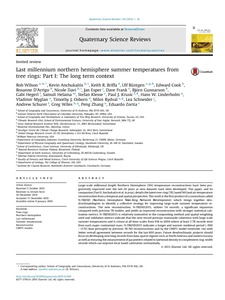Last millennium northern hemisphere summer temperatures from tree rings: Part I: The long term context
URI (для ссылок/цитирований):
https://elib.sfu-kras.ru/handle/2311/33185Автор:
Wilson, Rob
Anchukaitis, Kevin
Briffa, Keith R.
Büntgen, Ulf
Cook, Edward
D'Arrigo, Rosanne
Davi, Nicole
Esper, Jan
Frank, Dave
Gunnarson, Bjorn
Hegerl, Gabi
Helama, Samuli
Klesse, Stefan
Krusic, Paul J.
Linderholm, Hans W.
Myglan, V. S.
Osborn, Timothy J.
Rydval, Milos
Schneider, Lea
Schurer, Andrew
Wiles, Greg
Zhang, Peng
Zorita, Eduardo
Коллективный автор:
Научно-исследовательская часть
Дата:
2016-02Журнал:
Quaternary Science ReviewsКвартиль журнала в Scopus:
Q1Квартиль журнала в Web of Science:
Q1Библиографическое описание:
Wilson, Rob. Last millennium northern hemisphere summer temperatures from tree rings: Part I: The long term context [Текст] / Rob Wilson, Kevin Anchukaitis, Keith R. Briffa, Ulf Büntgen, Edward Cook, Rosanne D'Arrigo, Nicole Davi, Jan Esper, Dave Frank, Bjorn Gunnarson, Gabi Hegerl, Samuli Helama, Stefan Klesse, Paul J. Krusic, Hans W. Linderholm, V. S. Myglan, Timothy J. Osborn, Milos Rydval, Lea Schneider, Andrew Schurer, Greg Wiles, Peng Zhang, Eduardo Zorita // Quaternary Science Reviews. — 2016. — Т. 134. — С. 1-18Текст статьи не публикуется в открытом доступе в соответствии с политикой журнала.
Аннотация:
Large-scale millennial length Northern Hemisphere (NH) temperature reconstructions have been progressively
improved over the last 20 years as new datasets have been developed. This paper, and its
companion (Part II, Anchukaitis et al. in prep), details the latest tree-ring (TR) based NH land air temperature
reconstruction from a temporal and spatial perspective. This work is the first product of a consortium called
N-TREND (Northern Hemisphere Tree-Ring Network Development) which brings together dendroclimatologists
to identify a collective strategy for improving large-scale summer temperature reconstructions.
The new reconstruction, N-TREND2015, utilises 54 records, a significant expansion
compared with previous TR studies, and yields an improved reconstruction with stronger statistical calibration
metrics. N-TREND2015 is relatively insensitive to the compositing method and spatial weighting
used and validation metrics indicate that the new record portrays reasonable coherence with large scale
summer temperatures and is robust at all time-scales from 918 to 2004 where at least 3 TR records exist
from each major continental mass. N-TREND2015 indicates a longer and warmer medieval period (~900
e1170) than portrayed by previous TR NH reconstructions and by the CMIP5 model ensemble, but with
better overall agreement between records for the last 600 years. Future dendroclimatic projects should
focus on developing new long records from data-sparse regions such as North America and eastern Eurasia
as well as ensuring the measurement of parameters related to latewood density to complement ring-width
records which can improve local based calibration substantially.

